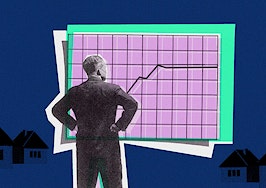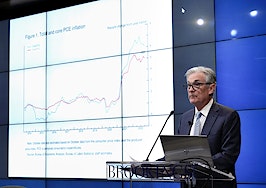No one can predict the future, but you can prepare. Find out what to prepare for and pick up the tools you’ll need at the immersive Virtual Inman Connect on Nov. 1-2, 2023. And don’t miss Inman Connect New York on Jan. 23-25, 2024, where AI, capital, and more will be center stage. Bet big on the roaring future, and join us at Connect.
Summer doldrums often just come with the territory in real estate, but demand for purchase mortgages fell for a fifth consecutive week last week even after adjusting for seasonal factors as mortgage rates climbed to record highs for the year.
That’s according to a weekly survey by the Mortgage Bankers Association, which showed demand for purchase mortgages was down a seasonally adjusted 0.2 percent last week compared to the week before, and 26 percent from a year ago. Applications to refinance were also down 2 percent week over week and 35 percent from a year ago.

Joel Kan
“Treasury rates were elevated again last week following mixed data on inflation and more indication of resiliency in the economy, which may pose a challenge to the Federal Reserve’s efforts to lower inflation,” MBA Deputy Chief Economist Joel Kan said in a statement. “Overall applications decreased because of these higher rates, as both purchase and refinance applications ended the week at their lowest levels since February 2023.”
The one bright spot was a 2.4 percent weekly increase in government-backed mortgages offered through FHA, VA and USDA loan programs.
Mortgage rates have surged to new highs for the year as closely watched inflation numbers suggest the full impacts of the Federal Reserve’s interest rate hikes have yet to be felt.
The latest consumer price index data release last week showed the annual inflation rate rose to 3.2 percent in July, up from 3 percent in June but an improvement from 8.5 percent a year ago.
On Friday, the core producer price index for July registered its largest month-to-month increase since November 2022, which also helped send yields on 10-year Treasury notes — a barometer for mortgage rates — to new highs for the year.
Mortgage rates hit new 2023 highs
Black Knight’s Optimal Blue Mortgage Market Indices, which track daily rate lock data, show rates on 30-year fixed-rate conforming mortgages hitting new highs for the year and threatening to surpass 2022 highs seen last fall.
Optimal Blue data shows rates on 30-year fixed-rate loans breached the 7 percent threshold on Friday, to a new 2023 high of 7.04 percent on the latest inflation data.
Rates have continued to climb this week as more inflation data comes in, with rates on 30-year fixed-rate conforming loans averaging 7.16 percent Tuesday. That’s equal to the 2022 high of 7.16 percent registered on Oct. 24.
Rates on jumbo mortgages too big for purchase by Fannie Mae and Freddie Mac have also climbed through the previous 2023 peak of 7.34 percent seen on July 28, to an average of 7.49 percent on Tuesday.
After pausing in June, the Federal Reserve on July 26 approved its 11th increase in the federal funds rate since March 2022, bringing the short-term benchmark rate to the highest level since 2001.
The debate over the Federal Reserve’s interest rate policy has shifted from whether the Fed will hike again in September, to whether it will bring rates down next year to prevent the decelerating economy from entering a recession.
Stronger-than-expected July retail sales numbers released Tuesday are “unlikely to make any meaningful difference to the outcome of the upcoming Fed meeting in September, but a sustained reacceleration in real consumers’ spending would make it harder for the Fed to justify cutting rates next year,” Pantheon Macroeconomics economists said in their latest U.S. Economic Monitor newsletter.
The CME FedWatch Tool, which monitors futures markets to gauge investor sentiment of the Fed’s next moves, puts the odds that the Fed will hike rates at its Sept. 20 meeting at just 11 percent.
But investors are pricing in only about a 42 percent chance that the Fed will start to lower rates by March in advance of the spring homebuying season. In July, futures markets predicted a 72 percent chance that the Fed would implement one or more interest rate cuts by that point.
Once it becomes clear that the Fed is ready to reverse course, that could help ease the abnormally wide “spread” between yields on 10-year Treasury notes and 30-year fixed-rate mortgages.
Wide primary mortgage spread may ease

The primary mortgage spread has climbed to 3 percentage points, or roughly a full percentage point above the historical norm. That’s in part because investors in mortgage-backed securities know that loans they fund now could be refinanced if rates fall next year, so they demand higher yields to offset prepayment risk.
The increased spread means that while mortgage rates have been pushed up more than Treasury yields, they could also fall faster as prepayment risk diminishes.
“If interest rate uncertainty returns to more normal levels and prepayment risk fell back to levels seen in the late 1990s, rates could fall – perhaps by half a percentage point,” researchers at The Brookings Institution wrote in June of the stubbornly persistent trend.
But continued strength in the economy means Fannie Mae forecasters don’t see mortgage rates coming down below 6 percent until the final three months of 2024. With rates high and inventories scarce, the mortgage giant’s monthly survey of consumers found 84 percent of Americans felt July was a bad time to buy a home, a record in polling data going back to 2010.
In a July 20 forecast, MBA economists said they expected rates on 30-year fixed-rate loans to dip below 6 percent in the final three months of this year. But they also predicted rates on the workhorse 30-year fixed-rate loan would average 6.6 percent during the current quarter, which in hindsight looks unlikely.
For the week ending Aug. 11, the MBA reported average rates for the following types of loans:
- For 30-year fixed-rate conforming mortgages (loan balances of $726,200 or less), rates averaged 7.16 percent, up from 7.09 percent the week before. Although points decreased to 0.68 from 0.70 (including the origination fee) for 80 percent loan-to-value ratio (LTV) loans, the effective rate also increased.
- Rates for 30-year fixed-rate jumbo mortgages (loan balances greater than $726,200) averaged 7.11 percent, up from 7.04 percent the week before. Although points decreased to 0.55 from 0.66 (including the origination fee) for 80 percent LTV loans, the effective rate also increased.
- For 30-year fixed-rate FHA mortgages, rates averaged 6.93 percent, down from 7.02 percent the week before. Although points increased to 1.17 from 1.14 (including the origination fee) for 80 percent LTV loans, the effective rate also decreased.
- Rates for 15-year fixed-rate mortgages popular with homeowners who are refinancing averaged 6.57 percent, up from 6.51 percent the week before. With points increasing to 0.94 from 0.92 (including the origination fee) for 80 percent LTV loans, the effective rate also increased.
- For 5/1 adjustable-rate mortgages (ARMs), rates averaged 6.20 percent, down from 6.36 percent the week before. Although points increased to 1.45 from 1.20 (including the origination fee) for 80 percent LTV loans, the effective rate also decreased.
Get Inman’s Mortgage Brief Newsletter delivered right to your inbox. A weekly roundup of all the biggest news in the world of mortgages and closings delivered every Wednesday. Click here to subscribe.
Email Matt Carter












